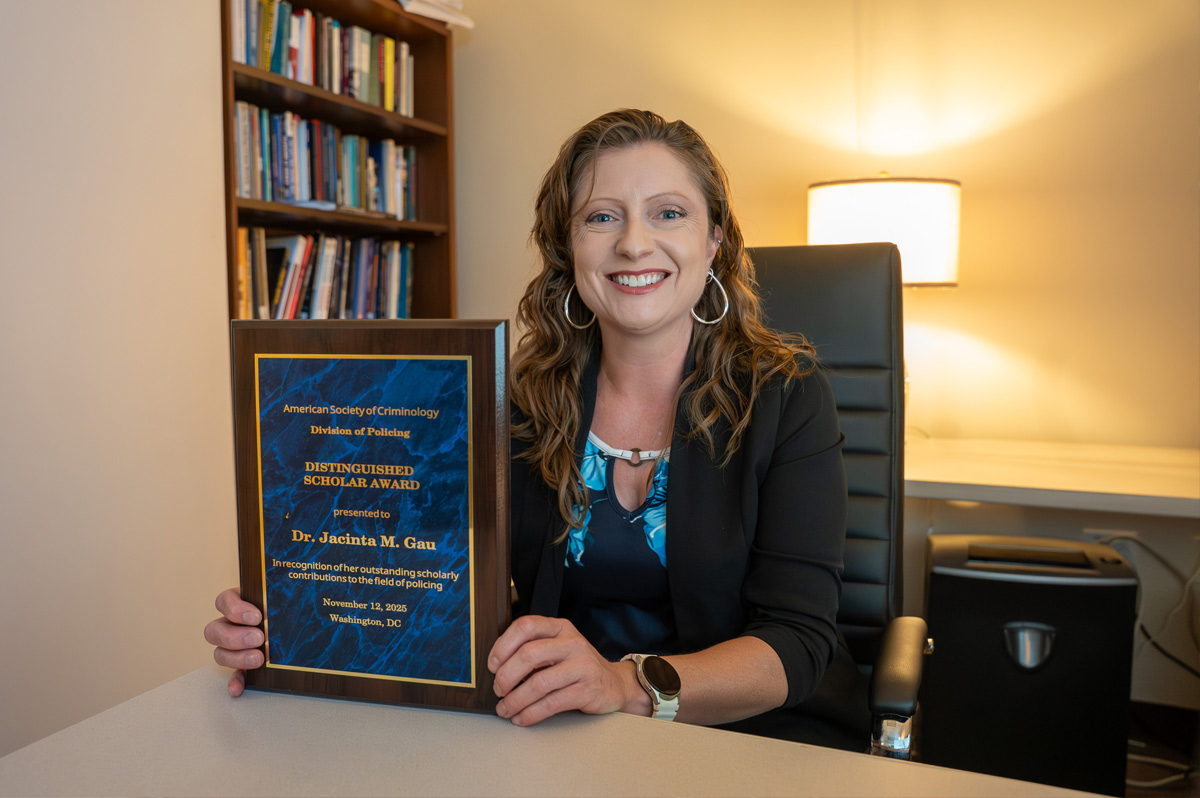
With a focus on police-community relations and procedural justice, Jacinta Gau is translating research into policies that improve public safety. (Photo by Danielle Hendrix)
Jacinta Gau’s career has been defined by her dedication to improving the relationship between police and communities. Now, that dedication has been recognized at the international level.
Gau, a professor in the College of Community Innovation and Education’s Department of Criminal Justice, recently received the 2025 Distinguished Scholar Award from the American Society of Criminology (ASC) Division of Policing.
The ASC is a national organization whose members pursue scholarly, scientific and professional knowledge related to crime and delinquency. Its Division of Policing aims to advance research and policy evaluation to help police maintain order, protect civil liberties and enhance public safety. Within this division, the Distinguished Scholar Award recognizes established, mid-career academic researchers who have made significant contributions to the field of policing.
Gau says she is delighted to receive this recognition from her fellow scholars.
“This award comes directly from my policing colleagues,” Gau says. “It’s a big honor to know my work is so appreciated within the discipline.”
The award celebrates the impact of Gau’s extensive research encompassing police-community relations, officers’ perceptions of the work climate, police and organizational legitimacy, procedural justice and beyond. Gau has contributed to numerous scholarly publications that advance understanding of how police practices shape public perceptions and institutional trust. She says she strives to make her research meaningful to practice.
“I try to make my academic work translatable to policy — something police practitioners can pick up and actually use to inform policy and improve their organizations,” Gau says.
Drawing from her research, Gau says one of the best ways for police organizations to build trust with their communities is to maintain open communication with them.
“Communities affected by critical incidents sometimes feel shut out,” Gau says. “They don’t get the information they want, they don’t know why communication isn’t happening, and they feel their wishes aren’t respected. Police can’t always share information during investigations, but even that needs to be communicated — what they’re holding back, why they’re holding it back, and when it can be expected. It’s about maintaining relationships proactively and showing people the police are working on their behalf.”
Gau is also interested in how technological advancements — especially in artificial intelligence (AI) — could help improve criminal justice policy across the board.
“There’s so much opportunity with AI in this field,” Gau says. “I’m following the research on how it can be used to analyze body camera footage. There are so many opportunities to commend officers for outstanding performance that nobody saw but their body cameras recorded. There’s also a lot of potential for AI to enhance the tracking of crime and bring about more accurate statistics.”
In addition to recognizing her research, Gau’s award also honors her commitment to mentorship. She sees her students as budding colleagues and mentors them with the goal of preparing them to become independent researchers and confident leaders in their disciplines.
“I take the next generation of scholars very seriously,” Gau says. “I treat them as students developing in their academic careers, but in my mentoring, I recognize them as my future peers. Even more than my published research, my legacy is the impact I have on my students, because that will trickle down into how they mentor their own students.”
As Gau reflects on her own experiences, she encourages students eager to drive change in the world of criminal justice to first discover what they care most about and then dedicate themselves to it.
“Working in this field can sometimes feel overwhelming and chaotic,” Gau says. “I try to remind myself and my students: You can’t do everything, but you can do something. Whether you’re working in the field or in academia, find out what your contribution is going to be. Figure out what matters most to you and try to make an impact there as much as you can.”